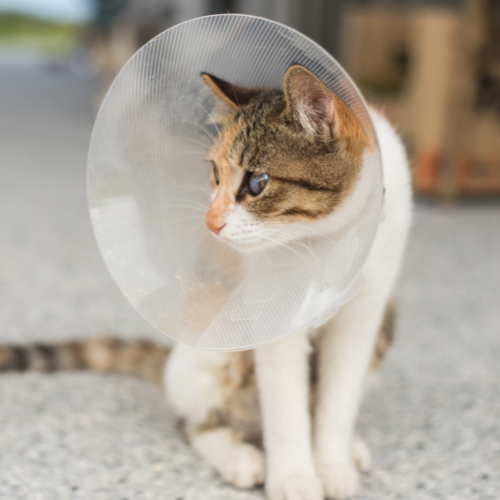Veterinary Services
Pet Surgery
Experience outstanding pet surgery expertise at Heartland Animal Hospital, Owatonna, offering services such as spay/neuters, soft tissue repair, and growth removal.

Surgical Services
At Heartland Animal Hospital, we understand how stressful bringing your pet for surgery can be. That’s why we work so hard to ensure that every surgical experience is as stress-free as possible for you and your pet. Our highly skilled veterinary surgeons perform a broad range of surgical services while always adhering to the highest standards of care. Our well-trained staff are Certified Veterinary Technicians (CVT) who are on hand to monitor our patients to ensure their health, safety, and comfort at all times and assist our veterinarians as needed. We want you to feel confident that when your pet is in our care, they are in caring, capable hands.
Soft Tissue Repair: Our dedication to your pet’s comfort and well-being extends to soft tissue repair surgeries. Whether your pet has suffered an injury or requires corrective surgery, our skilled veterinarians are here to provide the necessary care. Soft tissue repair can alleviate pain, restore mobility, and improve your pet’s overall quality of life. We prioritize their recovery, ensuring they enjoy their daily activities without discomfort or limitations. Trust Heartland Animal Hospital for compassionate and effective soft tissue repair because your pet’s comfort matters to us.
Growth Removal: At Heartland Animal Hospital, we understand that unusual growths on your pet can cause concern. Our veterinarians are experienced in performing growth removal surgeries to address these issues effectively. Whether it’s a benign lump or a suspicious growth that needs examination, we prioritize your pet’s health and well-being. Our surgical expertise ensures precise removal, minimizing any discomfort for your pet. With our dedicated care, you can rest assured that your furry family member will enjoy a happier and healthier life after the removal procedure. Your pet’s comfort and safety are our top priorities.
Preparing for Your Pet’s Surgery
Before your pet’s surgery, it’s essential to be well-informed and prepared for the procedure and post-operative care.
What You Need to Know Before Surgery
Many people have questions about various aspects of their pet’s surgery, and we hope this information will help. It also explains the decisions you will need to make before your pet’s upcoming surgery. As always, we are here to help and welcome any questions about your pets and their upcoming procedure.
Will my pet have stitches?
For many surgeries, we use absorbable sutures underneath the skin. These will dissolve on their own and do not need to be removed later. Some surgeries, especially tumor removals, do require skin stitches. With either type of suture, you will need to keep an eye on the incision for swelling or discharge. Most dogs and cats do not lick excessively or chew at the incision, but this is an occasional problem you will also need to watch for. If there are skin sutures, these will usually be removed 10 to 14 days after surgery. You will also need to limit your pet’s activity level for a time, and no baths are allowed for the first 10 days after surgery.
What other decisions do I need to make?
While your pet is under anesthesia, it is the ideal time to perform other minor procedures, such as dentistry, ear cleaning, or implanting an identification microchip. Please call beforehand if you would like an estimate for these extra services. This is especially important if the person dropping the pet off for surgery is not the primary decision-maker for the pet’s care.
When you bring your pet in for surgery, we will need 5 to 10 minutes to fill out paperwork and decide on the blood testing and other options available. When you pick up your pet after surgery, you can also plan to spend about 10 minutes reviewing your pet’s home care needs.
We will call you the night before your scheduled surgery appointment to confirm when you will be dropping your pet off and answer any questions you might have. In the meantime, please don’t hesitate to call us with any questions about your pet’s health or surgery.
Benefits for Your Beloved Pet
- Optimal Health: Spaying and neutering contribute to your pet’s overall well-being by reducing the risk of certain health issues and preventing unwanted litters.
- Pain Relief: Soft tissue repair surgeries address discomfort and improve your pet’s quality of life, ensuring they can enjoy every moment to the fullest.
- Enhanced Comfort: Growth removals eliminate potential sources of irritation and discomfort, allowing your pet to live without pain or disruption.
- Precise Care: Our surgical expertise ensures precise and effective procedures, minimizing the impact on your pet’s daily life.
